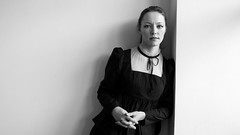Pyongyang’s Pizza Connection
The Dear Leader Kim Jong Il apparently is so fond of pizza that he decided, in his vast magnanimity, to ensure that the North Korean populace could also enjoy the privilege of having a pizza while in Pyongyang. He thus provided for the establishment of not one but two pizza restaurants in Pyongyang. We visited one and we learned that once a year two Italian chefs are flown in for refresher training for the staff. The restaurant we visited had a totally legitimate Italian feel with limoncello bottles for sale at 17 US$ and a margherita around 5 US$. I worked out that in comparison to the purchasing power of local salaries, a pizza and a beer cost the equivalent of 30 or 40 US$ in terms of European prices, so pizza is pretty much a luxury (shocker for a country with chronic food shortages), more or less like a sushi dinner in a fancy place is in Europe.
One of the guides asked about my opinion about the unfolding fiscal melt-down in Italy. I had caught the news on the BBC the night before so I explained the various measures that my beloved government has been taking to avert fiscal implosion. Leaving aside the slightly disconcerting fact that news of the Italian debt crisis had reached North Korea basically in real time, I will never forget the worried looks of our guide who, while living in the second happiest country in the world (according to Korean sources), seemed genuinely preoccupied with the prosperity of Italy and genuinely wished my country a speedy recovery from insolvency.
Out of body experience. Feat. The Great Leader, Comrade Kim Il Sung
As instructed by our travel company, we wore our best clothes for the visit to the Mausoleum where the Great Leader, Kim Il Sung lies in state in Pyongyang. The dress code requires a shirt, tie and smart-ish shoes for the gents and a long skirts for the ladies. I had to purchase a shirt in China before leaving for the DPRK, which has now become my Kim Il Sung shirt. We were slightly disappointed to find out that the rigid rules did not seem to apply to two Russian tourists who showed up in their blue batik shirts and sandals. The horror, the horror. When we pointed out the fashion faux pas, our guide shrugged and mumbled something along the lines of ‘Russians, they are like that’.
You leave cameras and all other belongings at the cloak room of the mausoleum, before walking the one kilometre that separates you from the glass coffin of the Father of Our Nation, the Great Leader Kim Il Sung. Like tin soldiers we march with other visitors, mostly Koreans brought in by their collective farms and factories to pay tribute to the Father of Our Nation, the Great Leader, Comrade Kim il Sung. We enter a big room with a marble (or is it plaster?) larger-than-life statue of the Great Leader, Sun and Father of Our Nation, Comrade Kim Il Sung against a pink and sky-blue background (recreating sunset, we gathered). The faux-plaster/faux-marble statue is lit with a light coming from above and a celestial sound is spat out by the speakers in the room. As told, we march in groups of four, get to a line marked on the floor, where we bow in front of the statue of the Great Leader etc. etc. Kim Il Sung. Thus we proceeded towards the Hall of Lamentation, where we are handed Sony MP3 players (made by the Imperialist Swines in Japan) whereby we can hear the mourning sounds (translated in English) of crowds of Korean lamenting the death of the Leader Maximo. The Koreans are luckier than us because they get a live rendition of the sorrows of the Korean people, courtesy of one of the guides of the mausoleum with indefatigable performance skills (As an aside, imagine having a business card that reads “So and So, Live Performer at the Hall of Lamentations of the Kim Il Sung Mausoleum. Just a thought for your next high school reunion). We are then showed a big collection of honours and awards received by Our Great Leader Father of the … you get the idea Kim Il Sung. These include, inter alia, certificates of honorary citizenships from Italy, France, Belgium and various other Western nations. We learn that those have been bestowed in acknowledgment of the Great Leader’s contribution to modern tought through his Juche idea (in case you haven’t yet, you can educate yourself about Juche here).
Finally we reach the Sancta Sanctorum of the Mausoleum. We pass a door that is like a mini car wash booth, where the soles of our shoes are brushed and we are sprayed some air (containing disinfectant? or perhaps it is communist holy water from Leningrad?). Ahead of us, lies the mummified body of Our Great Leader, perfectly preserved in a glass coffin. We march in rows of four, like little toy soldiers, in what is a spectacle of choreographed mourning. After forty minutes of interminable corridors, halls of lamentations, celestial visions of plaster statues the propaganda machine starts to work its magic. As we bow four times (one time for each of the sides of the coffin), I am only one step away from thinking to myself “Thank you Great Leader, Comrade Kim Il Sung, Sun of Our Nation. Thank you for being the Liberator and Father of the Second-Happiest Country in the World. Our Glorious Nation. The Democratic People’s Republic of Korea”
 Outside the Kim Il Sung Mausoleum, Pyongyang
Outside the Kim Il Sung Mausoleum, Pyongyang
Customs of the People’s Democratic Republic of Korea
Upon going back to my seat after lunch on the Pyongyang-Beijing train I found that my fellow travellers had indulged in a weird sort of packed lunch which included clams, bananas and pumpkin seeds. Pretending to find the crustacean lunch explosion and the remains thereof absolutely in tune with my expectations of what a Chinese packed lunch on a train might entail, I sat on my seat while filling the exit card and the custom declaration form of the DPRK.
I prepared myself for the two hours it would take to complete formalities. First an officer came, took all of our passports and walked away. As he left, I realised that my passport was now entrusted in the tender loving care of Korean authorities, much like it had been for most of my time in Korea. I had become again member of the international brotherhood and sisterhood of people whose passports are taken away from them and who are thus at the mercy of their sponsors or guardians such as minors and domestic workers in Saudi Arabia.
A second official came and our compartment began the hectic process of luggage inspection that had already caused considerable chaos all over our carriage. The process started shortly after the officer expressed some mild disgust at the manner with which the lunch leftovers had taken over most of the space on the table where the paperwork would have to take place. Perhaps hoping to get over the painful bit first the officer started with me. I opened both of my bags for the officer to have a look while also fishing out the electronic items I had declared on my form. The officer took my camera and tried to place it in the narrow empty space between the gaping carcasses of clams and the carpet of spat-out pumpkin seeds and banana peals. Then he proceeded to unwrap my phone which had been sealed in a paper envelope, stamped across the seal and wrapped in tape before being entrusted to my guide upon arrival at Pyongyang airport. Upon seeing a keyboard-less mobile not bigger than 5×7 cm the officer made a perplexed face and called a colleague over to show how Sony had managed to produce a Lego toy that can handle internet browsing and international roaming.
After that, the other passengers went through their customs checks. The numerous suitcases of the two Chinese business men were opened while the rest of us watched the process for its sheer entertainment value (incidentally, based on a nationally-representative sample of two people, I have decided that all Chinese traders are messy packers). Everything went smoothly until an undeclared phone was found in one of the bags. Some commotion ensued as the real owner of the suitcase was brought in from the other compartment. A calm exchange ensued via a Chinese passenger who was also fluent in Korean. More officers were summoned and a thorough search of the compartment took place as the mobile phone smuggler was sweating profusely. While I was wondering if we would be regaled with a body cavity search performed live on the train, the officer found some souvenir posters of mine which I was asked to unpack. Those were replicas of propaganda posters that we were told not to parade around customs. A perplexed look later the officer carefully packed the posters away and dished out my camera from the food-ocean and handed it over to a colleague who would go through all my photos to ensure they were all kosher. As the officer went through my holiday artsy fartsy pictures absent-mindedly some kind of solution had been found to the sino-korean mobile phone debacle, although what exactly happened is unclear to me. I noticed that the officer suddenly a 100 Chinese yuan (10 euro) note had appeared inside the pocket of the officer.
Eventually the customs inspection process came to an end and we received our passports back as well. We thus completed the 10 minute journey to Dandong, China where a life of free mobile phone usage and a bright future of clam lunches awaited us.
Get your vote out. It’s the DEMOCRATIC People’s Republic after all…
For more photos from the DPRK, check my Flickr account






